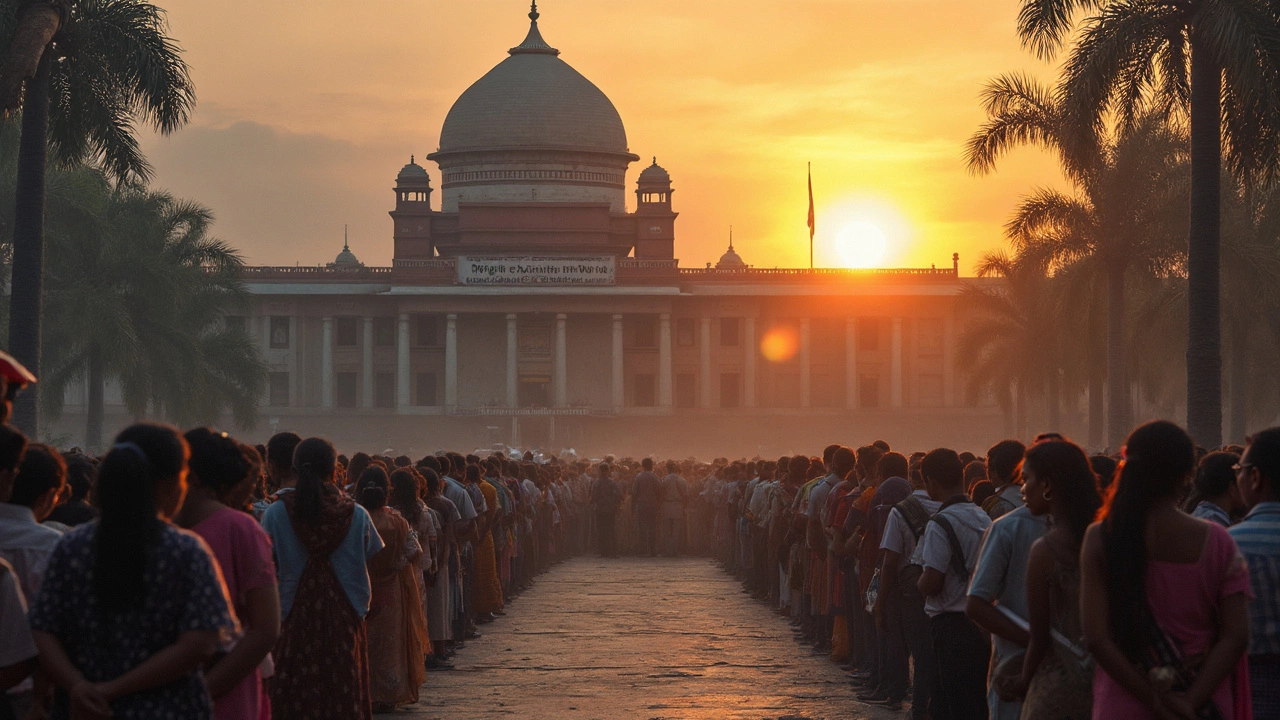Imagine spending years preparing for a single test, knowing your whole future hinges on a few hours. That’s not some movie plot—that’s real life for hundreds of thousands of students every year. Across the globe, some exams are so tough they’ve become legends. But which one takes the crown as the No 1 toughest?
It’s not just about tough questions or long hours. The hardest exam throws everything at you: competition, pressure, almost impossible cut-offs, and sometimes brutal pass rates. People travel miles and spend their life savings to prep for these, hoping for that golden ticket to a better life. The title for the toughest isn't just about the test, but the stress, stakes, and what happens if you fail. Everybody feels the pressure, and only a tiny handful actually make it to the other side.
- What Makes an Exam Tough?
- The Top Contender: Gaokao in China
- Other Exams That Push Limits
- Smart Strategies from Exam Survivors
What Makes an Exam Tough?
When you hear about the toughest exam in the world, it’s not just about tricky questions. What makes an exam brutal goes way deeper than that. It's a mix of how many people want to pass, how hard it is to get a good score, the amount of material you need to know, and the pressure that comes with it all.
First up, competition is key. Take China’s Gaokao—over 12 million students show up each year just to give it a shot. Lots of folks but not enough top spots. That means even super smart kids get squeezed out just because the numbers are crazy.
Second, let’s talk content. Some exams stretch over multiple days and cover years’ worth of knowledge. The Indian UPSC Civil Services, for instance, takes about a year, from the first application to the final interview, and covers everything from history to essay writing. Not exactly something you can wing last minute.
Pass rate is another major pain point. Some of these tests have less than 2% of people making the cut. That means for every hundred hopefuls, maybe one or two actually see the finish line.
Also, the pressure on students can get wild. In Japan, students prepping for university entrance exams are so stressed there's a name for exam anxiety—"examination hell." And don’t even get started on the costs—test prep books, tutors, and sometimes even moving cities just to get closer to better schools or coaching centers.
- Extremely high number of applicants
- Huge range and depth of topics
- Tiny acceptance rates
- Massive time and mental investment
- Life-changing stakes
Check out this table to see how some of the toughest exams stack up in terms of numbers:
| Exam | Country | Applicants (Yearly) | Pass Rate (%) | Duration |
|---|---|---|---|---|
| Gaokao | China | 12,000,000+ | 2-3 | 2 Days |
| UPSC Civil Services | India | 1,000,000+ | 0.2 | 1 Year |
| All Souls Prize Fellowship | UK | 100-200 | 0.8 | 2 Days |
| University of Tokyo Entrance | Japan | Over 100,000 | ~3 | 2 Days |
So when someone says their test was tough, remember—there’s tough, and then there’s level-boss tough.
The Top Contender: Gaokao in China
If you ask anyone in China about the most nerve-wracking part of growing up, most will tell you it's the Gaokao. This isn't just any college entrance test—it's the ultimate gatekeeper, shaping futures for millions every June. The Gaokao might just be the toughest exam in the world.
The pressure is real. The stakes? Even higher. Think about this: each year, over 12 million students sign up for Gaokao. There’s no backup plan, and no second shot in the same year. One bad day, and you’re out. The test lasts for nine hours over two or three days, covering everything from Chinese literature and math to foreign languages—usually English—and sometimes science or humanities, depending on what you want to major in.
| Year | Candidates | Pass Rate (Top Universities) |
|---|---|---|
| 2021 | 10.7 million | ~2% |
| 2022 | 11.9 million | ~2% |
| 2023 | 12.2 million | ~1.8% |
Just getting a spot in a decent university is a battle. Places at top schools like Tsinghua or Peking University go to less than 2% of test-takers. People train for this for years—some even start extra lessons from elementary school, and the whole family might move to a region with slightly easier rules. Preparation can mean 12-hour school days, endless mock tests, and barely any free weekends. Some students even take short naps standing up during breaks, just to squeeze out a few more minutes of study time.
Cheating? Forget it. Security is wild: there are facial recognition checks, metal detectors, and even drones watching for suspicious signals above test centers. Parents camp outside schools during the exam to show support and manage nerves.
If you need a dose of motivation, Gaokao shows how grit pays off. But it also reminds us just how high the bar can be when it comes to competitive exams worldwide.

Other Exams That Push Limits
The world isn’t short of brutal tests. If you think the Gaokao is tough, check out these monsters. Some of these exams decide your college door, some if you’ll become a doctor, and a few even if you’ll get a job at all. Let’s get specific.
- UPSC Civil Services Exam (India): This is the gateway to India’s elite government jobs. Imagine three rounds—prelims, mains, and interviews—that together can last almost a year. More than a million apply, but fewer than a thousand make the cut. Many spend years trying, with the syllabus so broad, you need to know everything from politics and science to current affairs.
- Union des Grandes Écoles (France): Known as the "concours," this series of written and oral exams can last up to nine hours a day for weeks. Only a handful succeed, but a spot gets you into France’s top schools—basically the country’s power pipeline.
- All Souls Prize Fellowship Exam (UK): Oxford runs this exam that is half myth, half marathon. Two days, four exams, and famously, one entire essay on a single word prompt (like "Mistakes"). Only two people are usually picked a year, sometimes none.
- USMLE (United States): If you want to be a doctor in the US, you have to pass all three steps of the United States Medical Licensing Examination. Each step is a monster by itself—lasting up to eight hours a day, with complex clinical questions. Fail a step and your medical dreams may end before they start.
Every country seems to have its own toughest exam legend. What makes these so bad isn’t just the format—it’s the pressure, the years of work, and the tiny passing rate. It’s not just a test; for many, it feels like a make-or-break moment.
Smart Strategies from Exam Survivors
You hear a lot about hard work, but what are people really doing to crush the toughest exams on the planet? Let’s skip the vague motivation and dive straight into the hacks and habits that top scorers swear by. These are tried-and-tested methods from students who’ve been through the wringer prepping for the toughest exam in the world and actually made it out on top.
First off, no one is doing this solo. Survivors say study groups are a game-changer. In China’s Gaokao, for example, students often form ‘study squads’—small groups who meet up early, quiz each other, and keep each other honest. If someone falls behind, the group steps in to pull them up. It’s peer pressure, but in a good way.
Another must-do is building a strict but realistic schedule. The best performers don’t just study more; they study smarter, blocking time for each subject and refusing to multi-task. Li Wei, a 2023 Gaokao top scorer, shared his daily plan online: 50 minutes of focus, 10 minutes of break, then repeat—sometimes up to twelve cycles a day.
- Practice with real past papers under timed conditions—don’t just read, solve.
- Use spaced repetition apps (like Anki) so you actually remember facts, not just cram the night before.
- Clear out social media or anything distracting from your phone.
- Eat and sleep like your brain depends on it—because it does.
- When you get stuck, talk it out. Survivors message friends, post in forums, or ask teachers until they get it.
Many survivors also learn from their fails, not just their wins. They track mistakes in a ‘mistake notebook’ and hit those weak spots even harder the next round. It’s not fun, but it works.
Wonder how hard it really is to crack these exams? Check out some hard numbers:
| Exam | Year | Appeared | Success Rate |
|---|---|---|---|
| Gaokao (China) | 2023 | 12.9 million | 2% for top-tier universities |
| IIT-JEE (India) | 2024 | 1.1 million | 0.7% |
| UPSC (India) | 2024 | 1 million | 0.2% |
Pulling it off takes way more than memorizing textbooks. You need grit, the right strategy, and a ton of honest self-checks along the way. If you’re eyeing one of these monster exams, stealing a few moves from those who survived wouldn’t hurt.

